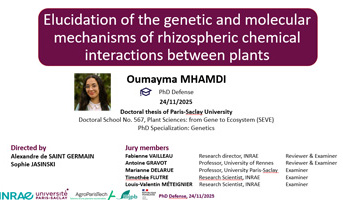Thesis defense: Oumayma Mhamdi
Allelopathy
root exudates
GWAS
metabolomic
Arabidopsis thaliana
Monday, November 24th 2025 2 pm - INRAE, Versailles
Elucidation of the genetic and molecular mechanisms of rhizospheric chemical interactions between plants
Allelopathy refers to the direct or indirect, beneficial or detrimental influences that plants exert on neighboring plants through the release of chemical compounds into the environment. While traditionally studied through the isolation and characterization of allelochemicals, the molecular mechanisms that underlie allelopathic interactions remain poorly understood. This thesis aims to address this knowledge gap by investigating the genetic and metabolic bases of belowground allelopathic interactions in Arabidopsis thaliana. To distinguish allelopathy from other plant-plant interactions, such as competition for nutrients, light, or water, an innovative phenotyping assay based on plants-soil feedback was implemented using an automated phenotyping robot. This approach enabled the quantification of allelopathic responses between the Col- 0 accession and a large collection of sequenced Arabidopsis accessions, revealing significant natural variation in allelopathic potential within this species. In the course of this thesis, I conducted Genome-Wide Association Studies (GWAS) on Arabidopsis and identified several candidate genomic regions and genes. Gene ontology enrichment analysis highlighted the pivotal contribution of specialized metabolites to allelopathic interactions. To further investigate these findings, functional genomic approaches were applied to validate candidate genes, with a particular focus on those associated with glucosinolates and allantoin metabolism. Given the complexity and challenges of highlighting allelopathic interactions, I also developed several experimental setups designed specifically to quantify these interactions and facilitate the assessment of candidate loci. In parallel, I developed a protocol for the collection, concentration, and untargeted metabolomic analysis of Arabidopsis root exudates, allowing the identification and quantification of allelochemicals and the definition of metabolic fingerprints (“metabotypes”) associated with different genotypes. Together, the integration of phenotypic, genetic, and metabolomic data provides new insights into the molecular foundations of allelopathy and expands the repertoire of potential allelochemicals mediating plant-plant belowground interactions. These results pave the way for the development of agroecological approaches based on the allelopathic properties of plants to control weeds in cropping systems.
Director: Alexandre de Saint Germain, "Strigolactones and Allelochemicals Signaling" SAS team, INRAE, IJPB, Versailles
Co-direction: Sophie Jasinski, "Strigolactones and Allelochemicals Signaling" SAS team, INRAE, IJPB, Versailles
Jury members
> Fabienne Vailleau (Rapportrice) - INRAE, Lipme, ECOGEN
> Antoine Gravot (Rapporteur) - IGEPP, DEBI, Université de Rennes
> Marianne Delarue (Examinatrice) - IPS2, Université Paris-Saclay, Gif-sur-Yvette
> Timothée Flutre (Examinateur) - INRAE, IDEEV, GQE - Le Moulon, DEAP, Gif-sur-Yvette
> Louis-Valentin Métegnier (Examinateur) - INRAE, PHIM, Montpellier
Research developed at the Institute Jean-Pierre Bourgin for Plant Sciences.
Allelopathy refers to the direct or indirect, beneficial or detrimental influences that plants exert on neighboring plants through the release of chemical compounds into the environment. While traditionally studied through the isolation and characterization of allelochemicals, the molecular mechanisms that underlie allelopathic interactions remain poorly understood. This thesis aims to address this knowledge gap by investigating the genetic and metabolic bases of belowground allelopathic interactions in Arabidopsis thaliana. To distinguish allelopathy from other plant-plant interactions, such as competition for nutrients, light, or water, an innovative phenotyping assay based on plants-soil feedback was implemented using an automated phenotyping robot. This approach enabled the quantification of allelopathic responses between the Col- 0 accession and a large collection of sequenced Arabidopsis accessions, revealing significant natural variation in allelopathic potential within this species. In the course of this thesis, I conducted Genome-Wide Association Studies (GWAS) on Arabidopsis and identified several candidate genomic regions and genes. Gene ontology enrichment analysis highlighted the pivotal contribution of specialized metabolites to allelopathic interactions. To further investigate these findings, functional genomic approaches were applied to validate candidate genes, with a particular focus on those associated with glucosinolates and allantoin metabolism. Given the complexity and challenges of highlighting allelopathic interactions, I also developed several experimental setups designed specifically to quantify these interactions and facilitate the assessment of candidate loci. In parallel, I developed a protocol for the collection, concentration, and untargeted metabolomic analysis of Arabidopsis root exudates, allowing the identification and quantification of allelochemicals and the definition of metabolic fingerprints (“metabotypes”) associated with different genotypes. Together, the integration of phenotypic, genetic, and metabolomic data provides new insights into the molecular foundations of allelopathy and expands the repertoire of potential allelochemicals mediating plant-plant belowground interactions. These results pave the way for the development of agroecological approaches based on the allelopathic properties of plants to control weeds in cropping systems.
Director: Alexandre de Saint Germain, "Strigolactones and Allelochemicals Signaling" SAS team, INRAE, IJPB, Versailles
Co-direction: Sophie Jasinski, "Strigolactones and Allelochemicals Signaling" SAS team, INRAE, IJPB, Versailles
Jury members
> Fabienne Vailleau (Rapportrice) - INRAE, Lipme, ECOGEN
> Antoine Gravot (Rapporteur) - IGEPP, DEBI, Université de Rennes
> Marianne Delarue (Examinatrice) - IPS2, Université Paris-Saclay, Gif-sur-Yvette
> Timothée Flutre (Examinateur) - INRAE, IDEEV, GQE - Le Moulon, DEAP, Gif-sur-Yvette
> Louis-Valentin Métegnier (Examinateur) - INRAE, PHIM, Montpellier
Research developed at the Institute Jean-Pierre Bourgin for Plant Sciences.
Back
